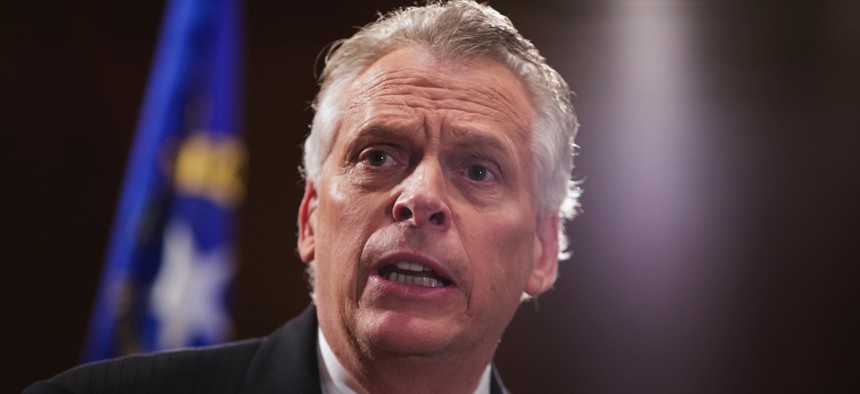Cybersecurity Education Heads to the Cloud in Virginia

Virginia Gov. Terry McAuliffe J. Scott Applewhite / AP Photo
Still in its infancy, the Virginia Cyber Range has partnered with Amazon to scale its closed-network training environment to the colleges, universities and even high schools that want it.
The Virginia Cyber Range, created this fiscal year by Gov. Terry McAuliffe to be a national cybersecurity education resource, is moving to the cloud for closed-network excercises and courseware sharing.
McAuliffe’s goal is workforce development through targeted educational investments, and the Cyber Range serves as both a repository for courseware—faculty syllabi and lesson plans from scattered public institutions—and a virtual training ground.
Universities teaching cybersecurity courses have for years required environments closed off from the rest of the internet to run attack and defend simulations without breaking any laws. In the past, some spent tens of thousands of dollars to purchase their own servers and configure their own network.
“The cloud is really becoming a great way to scale up network infrastructure quickly without having to purchase a bunch of space for it or find the equipment,” David Raymond, Cyber Range director, told Route Fifty in an interview.
Think of the closed network like the Danger Room in the “X-Men” comics, in which mutant students practice fighting to hone their powers without any real-world consequences. The cloud is like a room addition, enabling the network to scale to the size the Cyber Range needs it to be over the next 18 months—going from handling a dozen to hundreds of courses.
Amazon Web Services being the largest, most mature player in the cloud space, Virginia Tech Chief Information Officer Scott Midkiff approached their representative about getting credits to use the resource at no cost. In return, the Cyber Range functions as an AWS trial run for future offerings of its kind.
“Partnerships between the private sector and our academic institutions are critical to solving the cyber workforce challenge. Creation of the Cyber Range is just one example of the steps that the Commonwealth of Virginia is taking to position the state as a leader in cybersecurity,” McAuliffe said in a statement. “In Virginia and across the country, businesses, governments, and private individuals are impacted by the growing threat of cyber-attacks. We need a capable workforce that understands these swiftly changing threats and is ready to mount an agile defense against them.”
The governor likes to talk about 36,000 unfilled cyber jobs in the National Capital Region, and Virginia is geographically well-positioned to close the shortfall. For now, the Cyber Range aims to fill those empty positions with graduates from Virginia colleges and universities, Raymond said, but it could one day be training members of a cyber “fire department” of sorts.
Currently the Cyber Range is using its two-year budget to hire personnel and put cloud infrastructure together.
“We’re in a situation where we’re building the ship as we sail it,” Raymond said. “We’ve built enough backend and we’ve got three courses at two colleges in Virginia—two at Virginia Tech and one at George Mason [University] using the Range.”
More than 250 students are already involved, and at the end of February the Cyber Range held a “capture the flag” exercise at Virginia’s inaugural Cyber Fusion event and Cyber Cup Challenge. Nine universities and community colleges participated with plans to support high school summer camps in the works.
High school teachers with experience could use the Cyber Range as a resource during the academic year, Raymond said, expecting a “much wider use of the Range” by the fall—possibly two dozen schools and hundreds of thousands of students.
The Cyber Range levels the playing field in terms of schools lacking the expertise to assemble their own closed-network environment and teach their students how to secure such networks.
Everyone wants buy own hardware and have control of their own system, Raymond said, but the Cyber Range is both more viable and replicable elsewhere.
“We are thrilled to be a part of this important initiative in Virginia, which is one we hope will spark similar programs across the country,” Teresa Carlson, AWS worldwide public sector vice president, said in a statement. “It’s critical that we have a skilled cybersecurity workforce to meet the growing demands of the field.”
Dave Nyczepir is a News Editor at Government Executive’s Route Fifty and is based in Washington, D.C.
NEXT STORY: Federal websites must step up their game, study concludes






